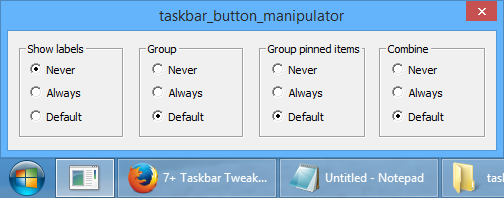7+ Taskbar Tweaking Library
7+ Taskbar Tweaking Library is a library for manipulating the taskbar of Windows 7 and above. It’s inspired by the 7+ Taskbar Tweaker program, and it allows you, as a programmer, to manipulate the Windows taskbar, which is virtually impossible to do with the documented Windows API.
You can take a quick look at the provided API here. For a more extensive look, refer to the examples which are provided together with the library.
In general, the library allows you to:
- Get extensive information about the taskbar items and groups on all taskbars.
- Reorder taskbar items, and reorder buttons within groups.
- Set per-AppId settings.
For example, if you’d like to have the taskbar button of your program to never show labels, you can easily do it with the library:

Download
You can get 7+ Taskbar Tweaking Library here:
![]() TTLib.zip (399.58 kB)
TTLib.zip (399.58 kB)
Please note that the library is free for non-commercial use only. If you’re interested in using the library for a commercial application, please contact me.
Command line tool
A command line tool based on the 7+ Taskbar Tweaking Library was created by the user Wasfi Jaouad. You can get it on GitHub:
https://github.com/WasfiJ/move_TaskBar_Buttons/releases
Example usage: mv_tb_btn.exe -g Notepad -f 5 -t 2
Moves button 5 to position 2 in button group named Notepad in the taskbar.
Please note that the tool wasn’t created and isn’t maintained by Ramen Software. I’m posting it here since it might be useful for users.